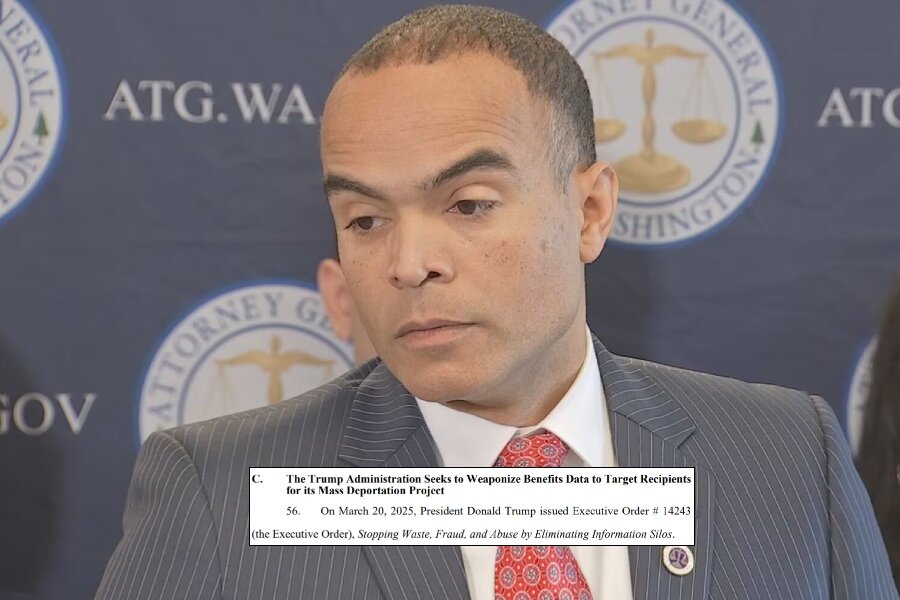Washington state is suing financial services company Fidelity Information Services (FIS) to prevent it from sharing food aid data with the federal government, according to a July 24 lawsuit filed with the State of Washington Thurston County Superior Court.
The Washington State Department of Social and Health Services (DSHS) administers the federally funded Supplemental Nutrition Assistance Program (SNAP) and state-funded Food Assistance Program (FAP).
FAP offers food benefits to noncitizens who are not eligible for SNAP benefits due to their immigration status. Over 1.2 million people in the state received benefits from these food assistance programs in fiscal year 2024, according to the lawsuit.
Applicants to the program must provide sensitive information such as names, addresses, social security numbers, and employment status, the lawsuit stated, along with information about everyone who lives with them. Households of mixed immigration status are common among SNAP and FAP recipients, the lawsuit added.
“It is common, for example, for a parent of citizen children to have an immigration status making the parent ineligible for SNAP, even though the children are eligible. In this situation, the parent is permitted to apply for SNAP on their children’s behalf and, since the children are minors, to be the account holder,” the lawsuit stated.
DSHS has partnered with Fidelity, tasking the company to process SNAP and FAP payments. To carry out the task, DSHS provides the company with information about SNAP participants. The contract clarifies that this data cannot be disclosed without the agency’s consent, according to the lawsuit.
The issue pertaining to the lawsuit traces back to an executive order signed by President Donald Trump on March 20, entitled Stopping Waste, Fraud, and Abuse by Eliminating Information Silos. The order says that agencies must ensure the federal government has “unfettered access to comprehensive data from all State programs that receive Federal funding.”
The Department of Agriculture (USDA) published guidance on May 6, stating that its Food and Nutrition Service agency was working with several payment processors to consolidate SNAP data.
On June 23, USDA published a notice stating that the agency proposes to create a new system of records that will include personal details of all SNAP recipients. When DSHS contacted Fidelity to reconfirm its nondisclosure commitment, the company did not respond to DSHS’s queries, the lawsuit stated.
The lawsuit alleged that USDA may hand over data it receives from Fidelity to the Department of Homeland Security, Immigration and Customs Enforcement, and the Department of Government Efficiency, which will allegedly “be utilized in service of a mass surveillance and mass deportation project unrelated to the purposes for which it was collected and unrelated to the purposes for which Washington residents entrusted their information to DSHS.”
“Food benefits recipients, including their family members and other people in their households, will be targeted for reprisals and deportation due to their lawful use, under federal and state law, of vital public assistance programs.”
The state asked the court for a restraining order and a permanent injunction.
In the June 23 notice published in the Federal Register, USDA justified the proposed system of records that will include information about SNAP beneficiaries. The main purposes of the new system are to validate the eligibility of SNAP beneficiaries and to ensure the integrity of the SNAP program, according to the department.
“This is consistent with USDA’s statutory authority and will ensure Americans in need receive assistance, while at the same time safeguarding taxpayer dollars from abuse,” said the notice. USDA will leverage data-sharing across state and federal systems to identify and correct duplicate, ineligible, or fraudulent SNAP enrollments, including “verifying eligibility based on immigration status,” it added.
The lawsuit was filed by Washington state Attorney General Nick Brown, according to a July 24 statement from his office.
“People who need food assistance for themselves and their families should be able to trust that their data will be protected and kept private,” he said. “If a contractor fails to uphold the terms they’ve agreed to, we will hold them accountable under the law.”
Share your thoughts by scrolling down to leave a comment.













